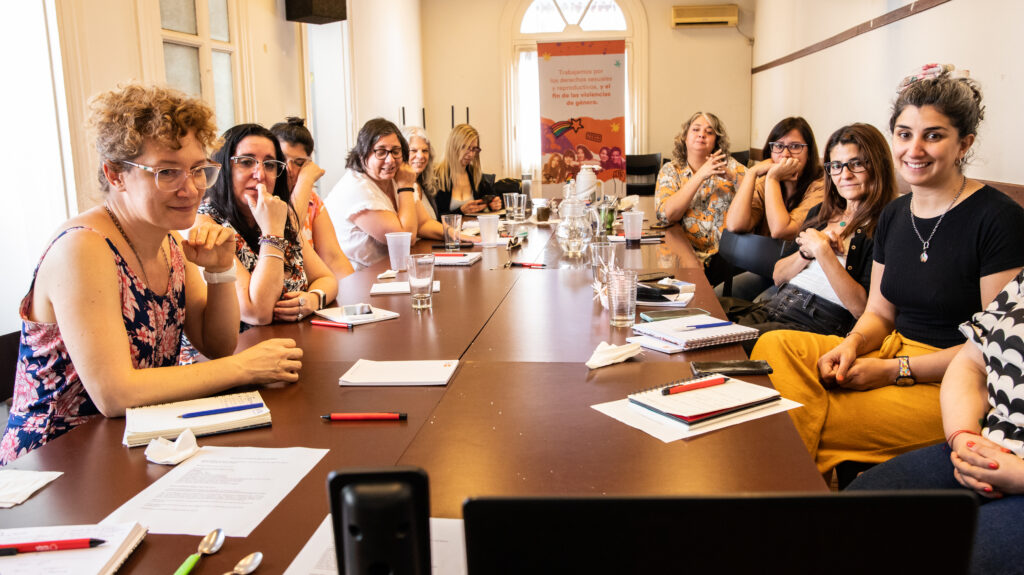Journalism in Argentina is fertile ground for gender editors: 13 media outlets created the position in their newsrooms in the past four years.
However, that has not saved these professionals from being targeted by online violence.
A recent unpublished study by Comunicación para la Igualdad found that 10 out of 12 gender editors interviewed in the country said they had been victims of attacks carried out through social networks or email.
According to 63% of them, the attacks happen periodically, at least twice a year. The same percentage said that the attacks are coordinated, and originate from anti-feminist profiles (87% of cases) and profiles of party leaders, political groups or other journalists (50%).
“Online violence is growing a lot. Feminist journalists and communicators are the most attacked on social media. We have all ended up making complaints about the threats and violence that we suffered. They want to silence us,” Mariana Iglesias, gender editor of Argentine newspaper Clarín, told LatAm Journalism Review (LJR).
Comunicación para la Igualdad, a civil association that works with communication, gender and human rights, exclusively provided LJR with data from the second edition of its survey “Gender editors in media in Argentina.” It was carried out by Belén Spinetta and coordinated by Sandra Chaher, and will be published in full in September.

Feminist demonstration in Buenos Aires in November 2018. (Photo: Monk fotografía / Flickr CC)
For the study, Spinetta spoke with 12 of the 13 journalists who have worked or continue to work as gender editors in Argentina, as well as their colleagues at four media outlets. It thus presents the current context in which these professionals work in the country.
Digital harassment (82% of cases) and attacks on the reputation and credibility of journalists (54%) were the most cited types of online attacks. In 27% of cases there were direct threats of violence and in 18% of cases there was non-consensual access to journalists' profiles and impersonation or identity theft. Still, 75% of them said the attacks did not make them doubt staying in the job.
Regarding work, seven editors said their workload had increased since taking the position, but only six said they had received a salary increase. Five said their working conditions have improved since assuming the position as gender editor. Five editors said that support from management of the media outlet where they work is “not very satisfactory,” another five said that the support is “satisfactory” and two said that it is “very satisfactory.”
Among their colleagues, most interviewees agreed with the statement that “the appointment of a gender editor at the media outlet where I work represented a step forward in improving the quality of information, incorporating new themes and expanding sources.”
There are now nine media outlets in Argentina with gender editors.
According to the survey, four editors resigned from their positions and were never replaced. This happened at Infobae, TN and El Trece, Radio and Television Services of the National University of Córdoba and El Tribuno de Jujuy.
Gender editors are still in place at Clarín; Letra P; Diario Jornada and Cadena Tiempo, from the province of Chubut; Diario Río Negro; Tiempo Argentino; Unidiversidad, media system of the National University of Cuyo; Télam; sistema de meios públicos da província de Chaco; and República de Corrientes.
These nine editors are part of the Network of Gender Editors of Argentina (REG, for its acronym in Spanish), which was created in November 2021 at the initiative of the United Nations Population Fund (UNFPA).
Online violence that affects so many women journalists around the world has plagued gender editors in the region, who said they have also seen an increase in attacks in recent years. Mariana Iglesias, for example, left Twitter – now called X – because of the attacks she received on that social network.

Argentinian journalist Mariana Iglesias, gender editor at newspaper Clarín. (Photo: Courtesy)
When she was named to the position in June 2019, Iglesias was the first gender editor for newspaper Clarín. She was also the first gender editor in Argentina and Latin America.
Her appointment took place in the wake of the #NiUnaMenos (Not one less) uprising against feminicides and the “Marea Verde” (Green Wave) for the legalization of abortion in the country. These struggles, her news coverage, and subsequent online violence continue to permeate her work.
“They threaten me, they call me corrupt, that I receive money, that I am a murderer, because I support safe and free legal abortion. (...) Online violence is growing a lot. Feminist journalists and communicators are the most attacked on social media. We have all ended up making complaints because of the threats and violence that we suffered. They want to silence us,” Iglesias said.
One of the most emblematic cases of online violence in the country was the defamation campaign and online attacks that started in January of this year against Argentine journalist Marina Abiuso, then-gender editor of the channels El Trece and Todo Noticias (better known as TN), of the Clarín group. Both are highly rated channels in Argentina, and TN was the most watched news channel in the country in 2022.
In posts replicated on various social networks, Abiuso was accused of being responsible for alleged negligence in TN’s coverage of the trial of Magdalena Espósito Valenti and Abigail Páez. They were sentenced to life in prison in February for the 2021 murder of Valenti's son, a 5-year-old boy.
The fact that Valenti and Páez were a couple and attended feminist demonstrations was used by anti-feminist groups to attack activists of women's movements in Argentina. Abiuso, who has always publicly positioned herself as a feminist journalist and participated in the genesis of the #NiUnaMenos movement and the campaign for the legalization of abortion in Argentina, became the main target of these groups.
The wave of hatred against Abiuso was repudiated by several entities in the country, such as the National Journalism Academy and the Argentine Journalism Forum (Fopea), as well as by her colleagues in other media. It also motivated her departure from Twitter.
“It was a very serious situation and involved many threats,” Abiuso told LJR in April 2023. “I already had an open case due to threats and I had to make three more presentations. It managed to scare me. I had had other circumstances that had not had that effect, and this time yes, it managed to scare me. It was really very severe, especially because of how big it was. Entertainment journalists suddenly joined, so the issue was discussed in entertainment programs.”
Being on the air on the channel where she worked and with the sensationalist coverage on these programs, Abiuso felt very exposed and feared for her physical safety.
“I am an ordinary journalist who travels by subway, so there was a moment of great fear. Beyond the fact that there were circumstances in which they took photos of me and said where I was, I am not afraid that they will come looking for me. A chance meeting scares me more. If a person has seen on television that I defend child rapists and crosses me on the street, I feel that something could happen in that circumstance,” she said.
Abiuso had worked at TN since 2015 and became a gender editor in 2021. She said that her fears when taking the position were “that the position involves a lot of exposure, and [I feared] that I would not be able to do a job worthy of that exposure.”
“That was my fear, much more than violence. I was already experiencing violence, so I underestimated how much violence could grow. My fear was much more that the channel is very large. It is on the air for 24 hours, that is, my fear was not being able to make real changes and that the position would end up being like an empty shell,” she said.
She said that an important project she carried out while gender editor at TN was the creation of new image banks, to be used in the coverage of cases of violence against women and children, for example. Abiuso said she had many allies in the archival and image editing sections to complete this work.
“There are many images that we knew we didn't want to use anymore. But this is a 24-hour live television channel, so when you tell someone that something is not [good], you have to replace it with something else, because they need to have an image to put on the air. (...) Now we know that we have these images to use and that we are not going to use the previous ones anymore,” she said.
For Abiuso, the main challenge for gender editors in the region today is “the demonization of the role.”
“There is a very bad understanding outside of the media of what gender editors are supposed to do and it is our job to change that narrative. We must answer by doing better journalism. The answer is always more and better journalism,” she said.
Abiuso spoke with LJR in mid-April, and on May 1st she posted on her Instagram profile that she no longer worked at TN and El Trece. “I'm ending an eight-year cycle (!) at El Trece and TN. I worked with excellent colleagues. I take with me many lessons and a great experience,” she wrote.
Women's movements have taken thousands of people to the streets of Argentina in recent years against sexist violence and in favor of the legalization of abortion. The mobilizations conquered rights and transformed journalism in the country, Spinetta told LJR.

Argentinian journalist and researcher Belén Spinetta. (Photo: Courtesy)
“In 2015, we had a mobilization called for by networks with the slogan #NiUnaMenos that became a political event of enormous magnitude. (...) And then there was the fight for abortion, which did not start in 2018, because the campaign started in 2006. But you have never seen a million and a half women in this country at one in the morning waiting for Congress, listening to what the deputies were discussing, discussing everything they said,” the researcher said.
Women's movements promoted, among others, the approval of the Micaela law (27,499/2019). Named in honor of Micaela García, a victim of a feminicide in 2017, the law “establishes mandatory training on the subject of gender and violence against women for all people working in public service.” They also urged the passage of the law on access to voluntary termination of pregnancy (27,610/2021); and the gender equality law in communication services (27.635/2021).
“Faced with this overwhelming reality of the feminist movement that advances, that demands, the media either fade or fall behind,” she said.
The adaptation also took place through the creation of the position of gender editor. However, as the research carried out by Spinetta pointed out, some of these media outlets did not keep the position when the first journalists resigned, in a possible indication of poor commitment to the issue.
In addition, according to the researcher, there is now a “new scenario,” forged by the losses caused by the pandemic, by the deep Argentine economic crisis and by a government that “has not been able to solve any of the problems of this country,” she said.
“That gives ground for the more right-wing sectors that propose to go against labor conquests to grow. Here there are openly candidates who say that 'if I win, I will close the women's ministry,’ a conquest that is four years old, it was created with this government, also a product of all this struggle,” Spinetta said.
Gender editors are at the center of these disputes, Spinetta said.
“[They] were born with a very large feminist force in the street, and now it is not that that has receded, but there is no unifying demand, as it was with abortion, 'let's all go for this law.' Now why are we all going? Against the debt, against [fiscal] adjustment, against violence? This is more up for discussion,” she said.
One of the objectives of the Network of Gender Editors of Argentina (REG), promoted by UNFPA, is precisely to accompany these professionals after a certain dispersion of the feminist movement in the country, Mariana Isasi, head of UNFPA in Argentina, told LJR.

Mariana Isasi (first on the left) during a meeting of the Network of Gender Editors of Argentina. (Photo: Clara Campos / UNFPA Argentina)
“At this moment, one of the challenges has to do with the fact that having advanced in some rights that we have been demanding for a long time and that have come to fruition, the women's movement has been somewhat disjointed in Argentina, and these positions have remained kind of exposed and alone. For this reason, from our place, from what we can do, as a United Nations body, accompanying them was part of what we thought was necessary to strengthen them, so that they can continue exercising their role,” she said.
For Isasi, one of the main challenges for editors and also a way to mitigate violence against them is to clarify what this position is, both within media and to the public.
“Many times they claim things that have nothing to do with their work and that they do not have the power to do. They can influence some issues, but ultimately the person responsible for the content that appears in any media outlet is the media outlet,” she said. “A bit of what has happened in some cases is that they have been put as referents and have to answer any question that appears in the media. The gender editors are not responsible for all the content that comes out or doesn't come out. Another challenge is to clarify this and, above all, that the media take responsibility for what happens in each of the media outlets.”
Banner: Protester during first #NiUnaMenos demonstration in Buenos Aires, in June 3, 2015. Photo by Leandro Martinez / Flickr CC.